Champions of Mental Health 2023 Recipients
In 2021, CIPSRT put out a call for its inaugural Champions of Mental Health awards program. In response, we received over 200 nominations from public safety sectors across Canada. We have been overwhelmed by the eagerness of people to hold up their peers as positive examples of those working toward actively improving the mental health of people in their organizations.
Now in our third year celebrating Champions of Mental Health we were once again overwhelmed by the positive response to our call for nominations. The selection committee, which included previous Champions, members of our Public Safety Steering Committee, and CIPSRT staff, had the privilege of reading nominations that detailed the stories of passionate and committed Public Safety Personnel (PSP) from across Canada who truly “walk the talk” when it comes to supporting their colleagues’ mental health and wellbeing.
PSP were nominated from diverse sectors and provinces across Canada. It was difficult to narrow it down to the 20 recipients celebrated here, with so many deserving nominees.
We congratulate each of our 2023 Champions for improving mental health in their organizations. Each of the recipients has inspired us at CIPSRT. We believe their stories will also inspire future mental health champions. Please read on to learn more about the great work they are doing in their organizations.
Nomination Criteria
To be considered a Champion, a nominee will be evaluated on the following criteria:
- Commitment to evidence-based/evidence-informed practice
- Impact on the mental health of their organization and community (i.e. changes or improvements they have been able to make)
- Number of people positively affected by their mental health efforts
- Willingness to speak about their mental health journey
- Creation of mental health and wellbeing resources and/or programming
- Commitment to decreasing mental health stigma
- Activities as a peer supporter or member of a reintegration team
Mental Health Champions are passionate and genuine when it comes to supporting the mental health and wellbeing of everyone in the organization.
Anyone within a public safety organization, sworn or civilian, may be nominated for recognition by CIPSRT as a Champion of Mental Health. To be considered, a nominee must work for one of CIPSRT’s recognized Canadian public safety sectors:
- Border Services
- Corrections
- Public Safety Communicators (911, dispatch)
- Firefighters (including volunteer)
- Emergency Managers
- Operational Intelligence personnel
- Police
- Paramedics
- Search and Rescue personnel (including volunteer)
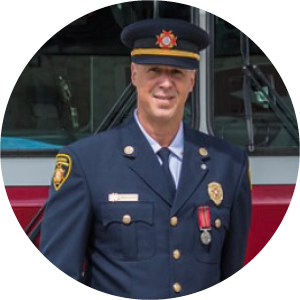
Brian Brown
Fire and Life Safety Educator, New Brunswick Fire Peer Support Network (NBFPS-RSPP), ADK9 Handler (Maureen)
Brian plays a crucial role in delivering mental health support to firefighters across nearly 200 fire stations in New Brunswick.
Having been diagnosed with PTSI and severe PTSD in 2015, Brian encountered significant challenges. However, through personal resilience and determination, he has successfully managed his own mental health struggles. Today, Brian wears multiple hats within the fire service and volunteers extensively to assist others in navigating mental health challenges.
“When I was diagnosed, I felt lost and unsupported. I didn’t have anyone in my life who had experienced PTSD and emerged successfully from it, so I lacked hope. My workplace at the time was ill-equipped to provide the necessary support, so I took it upon myself to become my own advocate and find a way forward. From a point of despair and contemplating suicide, I’ve managed to return to work. It’s crucial for those grappling with mental health issues to realize that there is a path to recovery.”
In January 2021, with the support of a grant from Bell “Let’s Talk,” the New Brunswick Association of Fire Chiefs and the Office of the Fire Marshal (NB) launched the New Brunswick Fire Peer Support Network. A year later, Brian not only Coordinates the Network, but is also the Office of the Fire Marshal, Fire and Life Safety Educator and went on in 2023 to also become the second K9 handler in the office with K9 partner Maureen.
The Network offers resources and peer support to 167 fire stations and approximately 5,500 firefighters across the province, including numerous volunteer fire departments. Advocating for both firefighters’ mental and physical wellbeing, the Network serves as a crucial lifeline within the community.
“I believe that education plays a pivotal role in dispelling misconceptions surrounding mental health. It’s about helping individuals understand that mental health struggles don’t equate to a life sentence. While there may be challenges or limitations, these circumstances can often lead to unexpected opportunities. My career trajectory from law enforcement and corrections to running a peer support program in the Office of the Fire Marshal is a testament to that. I’ve discovered a profound passion for what I do.”
Brian acknowledges that not everyone is ready to openly discuss mental health, but he emphasizes the importance of fostering an environment of mindfulness and empathy among all members.
“Some individuals may not recognize the need for mental health support, and that’s okay. However, it’s crucial for everyone to be mindful of the wellbeing of those around them, whether it’s a colleague sitting beside them or a loved one at home.”
Brian’s overarching goal is to support individuals on their journey toward mental wellness, regardless of the pace. “I often remind people that progress, no matter how small, is still progress. Whether it’s a tiny step or a giant leap, my aim is to help individuals carrying the weight of their pain to keep moving forward.”

Sarah Easterbrook
Team Lead, Corrections Employee Wellness Unit, Ministry of the Solicitor General, Ontario
An 11-year Probation and Parole Officer who has been a strong proponent of trauma-informed care, Sarah moved to the Corrections Employee Wellness Unit eight years ago. In this unit she works with a small but mighty team to develop and implement strategies (many are joint initiatives with their union partners) that will prevent and mitigate the impacts of occupational stress that correctional staff in Ontario may experience. This includes all staff working in provincial institutions and probation offices.
Some of the projects she has worked on include but are not limited to: bringing a ten-week mindfulness resilience program to staff, the development of the first employee-focused newsletter, multiple presentations, mindfulness supports and, project managing the development of the Corrections Peer Support Program.
“It is critical that public safety personnel (PSP) engage in mental health supports (and for their organizations to support them in this area), as they are often exposed to high levels of trauma and adversity, which often affect them.”
Sarah points out that most PSP go into their line of work to help people, only for some to get injured because of their occupation.
“It’s key that they are provided support at the onset and throughout their career. It’s important they understand that yes, they will experience adversity, but it can also lead to post-traumatic growth.”
She says normalizing the occupational hazards of PSP work is crucial so that when the time comes that someone needs to reach out to engage support, there is no shame attached to it, but instead it’s a sign of strength.
“It’s important that people are provided with support to help inoculate them to stress, for example resilience training, so that when they do experience something, they feel equipped to take charge and seek help. We need to change this idea that strength and bravery should come from having a ‘stiff upper lip’, to understanding that true strength is actually about acknowledging what might be going on, and that it’s ok to not be ok.”
Her experience as a Probation and Parole Officer has led her to become an advocate for a trauma-informed care framework for all those working in corrections. She believes the framework not only benefits those in the Criminal Justice System, but it also helps public safety personnel who work with them.
“When a probation officer or a corrections officer holds a mindset that ‘some people won’t change’ or carry anger at people that have done bad things, it actually has a negative impact on them and their health, so bringing in compassion helps not only those being helped, but also the helpers.”
Sarah came to appreciate the importance of mental health supports and self-care, when she experienced a bad break-up two years into her career as a probation officer. This led her into some dark days, but it also propelled her onto a path of self-discovery and empowerment. She says it opened the door to a new journey that she continues on today.

Brian Forbes
Advanced Care Paramedic, Region of Durham Paramedic Services, Whitby, Ontario
Brian has played a key role in the development of the Peer Support program for the Region of Durham Paramedic Services (RDPS) as well as assisting with other peer support programs within the Region and across Ontario.
As one of the coordinators of the RDPS Peer Support Team, Brian, working alongside his co-coordinator Ed Lewandowski, was one of the driving forces behind several initiatives designed to redefine how paramedics are supported both before and after critical incidents while focusing on building morale and resiliency.
“In our profession, struggle is inevitable, but it is crucial to remember that we do not need to struggle alone. It is important for us to acknowledge, sit with, and work through these mental health challenges together to draw on the strength of others.”
Because there is no playbook or definitive outline for the training of Peer Support members, Brian helped to develop and implement a process to onboard and train new Peer Support Team members. In 2023, after a 4 day training program, 14 new members were welcomed into the program.
Brian believes a critical factor in normalizing conversations about mental health is the creation of a culture of checking in on each other. He says this type of culture creates space for vulnerability and helps to build trusting relationships that can be accessed in challenging times. He points to a call he received one evening after a station visit from a veteran Paramedic with nearly 30 years experience. The paramedic said they had been struggling after a particularly bad motor vehicle accident a few weeks prior.
“We had a lengthy conversation and I listened mostly. We were able to set up a plan for some time away from work, some self-care strategies, and referrals to mental health practitioners. A few months later after they had returned to work, they thanked me for the work that our team has done in shifting the culture and making safe spaces for these conversations. It really showed me that our team is making a significant difference across our organization.”
Brian points out that the profession now spans multiple generations, and perspectives on the work and its challenges can vary along generational lines. He believed it is crucial, therefore, to tailor the approach to the members, and to meet people where they are at. He believes this approach is helping to bring change to the way mental health and mental health challenges are perceived within the profession.
“It can be a challenge to get everyone aligned with the same goals. This is especially true across generations. Older generations sometimes feel that ‘they made it through’ so the younger generations should too. Changing small things at a time and continuing to push forward little by little seems to have had a significant impact in our organizations over time.”

Louis-Francis Fortin
Section Head, Police Assistance Program (PAPP), Montreal City Police
As a psychologist and head of the Police Assistance Program (PAPP) with the Montreal City Police, Louis-Francis leads a team which coordinates mental health crisis intervention services, supports for specialized units, and prevention services. PAPP has worked with police organizations at the national and international levels to assist in the implementation of prevention programs.
“There is an obvious logic in taking care of those who put themselves at risk to protect all of us. Taking care of the psychological health of police officers only brings benefits, to their level of operational performance, to a positive work environment (social support is one of the protecting and resilience factors that has the biggest impact), as well as to the quality level of the relations between the organization and the community (a healthy organization will have a healthy relation with the community).”
With the PAPP team, Louis-Francis contributed in developing and implementing an internationally recognized suicide prevention program which helped contribute to the reduction of suicide rates amongst police agents by 79%. The program has been recognized by the World Health Organization as a model for suicide prevention.
“The creation of preventive support measures must be based on a balance between organizational responsibility with regards to health and security at work, as well as the members’ individual responsibility to use the tools available to them to manage and preserve their psychological health and wellbeing. For example, we can train sexual crime investigators to protect themselves from compassion fatigue and vicarious trauma, but the organization must be equipped to support them to implement measures when work reorganization needs will arise. This is crucial if we want to reach an effective level of protection.”
With PAPP, Louis-Francis implemented and offered workshops to thousands of employees to reduce the stigma associated with asking for psychological help. He implemented outstanding training in psychological first aid, and an innovative support resource. He encouraged police agents to share their experiences, which resulted in a 50% increase in PAPP consultations. He also helped to expand the psychological safety net for Montreal police agents by helping to incorporate prevention and intervention into various police duties. This reduced the amount of sick leave incurred.
“In many training or awareness initiatives, we choose a joint approach, with a psychologist and a police officer as instructors, which helps the officers better relate to the content. The examples and strategies used are hands-on and adapted to their reality. This approach is very efficient to fight against stigma, and it also improves confidence in the psychological services.”
Louis-Francis believes that key to the success of support programs is collaboration.
“To succeed, we need to have a long-term vision, and we must work in teams and find stakeholders of influence within our organizations. Teamwork is what can really make a difference.”
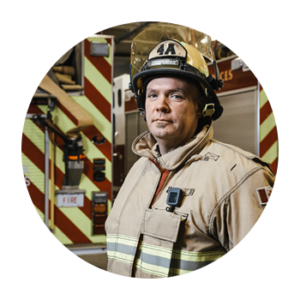
Todd Frei
Firefighter, Regina Fire and Protective Services
A committed firefighter, Todd has played an integral role in promoting mental health awareness strategies within Regina Fire and Protective Services since 2010. Joining Regina Fire and Protective Services in 2008, Todd’s dedication to supporting the wellbeing of public safety personnel (PSP) is unwavering.
“Managing our mental health through training and self-awareness is vital for PSP to effectively recognize and address mental health challenges before they impact both work and personal life. By prioritizing our own mental health, we become better equipped to support our fellow PSP in their mental health journeys.”
Trained as an International Association of Fire Fighters (IAFF) Peer Support member in 2018 and as a Road to Mental Readiness (R2MR) trainer in 2019, Todd has been instrumental in leading both the Critical Incident Stress Management (CISM) and Peer-to-Peer teams. Currently chairing both committees, Todd is also the mental health representative on the newly established wellness committee, advocating for enhanced mental health support for all department members.
“Normalizing discussions about mental health in our day-to-day interactions at the Fire Hall is crucial. Connecting everyday situations to our mental health helps destigmatize the topic and encourages open dialogue. I’ve witnessed firsthand the positive impact of these programs on our members.”
In December 2018, Todd completed the R2MR Train the Trainer program in Winnipeg and subsequently delivered the program to the entire department over the following five months. Observing a gradual increase in willingness to discuss mental health within the department, Todd is encouraged by the progress made.
“When discussing mental health with colleagues, I emphasize that mental health is universal. No matter how brave or tough a firefighter may be, neglecting mental health can undermine their resilience. It’s essential to recognize that mental health challenges can arise from the accumulation of everyday calls, not just the extraordinary ones.”
In addition to his Peer Support and R2MR endeavours, Todd collaborates with CIPSRT and Dr. R. Nicholas Carlton at the University of Regina on various initiatives. Serving as a facilitator in a two-year study, Todd plays a vital role in teaching techniques across different mental health strategies.

Bethany Haeckel
Hearings Officer, Canada Border Services Agency, (Intelligence and Enforcement Operations Division), Calgary, Alberta
An employee of Canada Border Services Agency (CBSA) since 2007, Bethany has put significant effort into bringing awareness to the importance of mental health in her profession.
She believes that bringing mental health concerns out of the shadows and encouraging employers to have sound policies for supporting public safety personnel through mental health challenges and injuries is important for preventing long term problems.
“I think talking openly about mental health challenges and successes is powerful. Just being open to those conversations and committed to destigmatizing this subject matter means a lot to people.”
Bethany participates in a peer support team in the Prairie Region, and she is proud of the work being done by the team. She is the employee co-chair of the building’s Wellness Committee. Through the group, she has started curating a wellness bulletin board, and she is working towards finding space for a Wellness Room within the team’s work environment.
Recent wellness surveys initiated by Bethany indicate that many colleagues’ wellness needs are tied to issues of diversity and inclusion, so the team is working on finding a welcoming space for a variety of activities, including daily prayers, sensory-relief breaks, and infant-feeding needs.
Bethany believes addressing misconceptions about mental health is essential and that mental health and physical health are equally important.
“I would say I am known for being outspoken and passionate. Mental illness can create some real safety concerns in a public safety work environment. I try to work towards countering the stigma by exposing this topic to as much openness and conversation as possible. Everyone will face at least some challenges to their mental health and wellness at some point in their career, so the more we talk about and acknowledge it, the better prepared we can be to come through those tougher times successfully.”
For Bethany, prioritizing her own mental health is important, but she says it has not always been easy for her. Over the last few years, she’s found that setting aside time and energy to see a psychologist regularly is a valuable investment in her overall wellbeing, and helps her to be kinder to herself. She is very open about her positive experiences with therapy because she feels that it is just as important as physical healthcare. She says it helps her to be her best self and show up more meaningfully for her family, friends, and colleagues. She hopes that she can help to destigmatize this type of healthcare and make it more accessible to others, including in her role as a peer support agent.
Bethany also prioritizes getting outside with her family for walks, hikes, bike rides, and cross-country skiing in the winter. She believes there’s something restorative about being active outdoors, in any weather. She’s also been practicing yoga for many years and finds it to be a great mental health support.
Bethany is excited about her work as a mental health champion in her role on the peer support team, and she is hopeful that the team’s work will result in the creation of an employee wellness space and a welcoming work environment for all.

Dennette Harrison
Transportation Sheriff, Albert Sheriffs, Edmonton, Alberta
Dennette Harrison is revolutionizing mental health support in Alberta Sheriffs Branch by championing an evidence-informed peer support model rooted in best practices.
“The greatest strategy we have is to ensure our peers feel seen, heard, and understood by their respective peers. While we work a variety of jobs, we have incredibly unique things in common. We are expected to answer a call into the unknown and approach our everyday working hours with a level of assessment and caution, and drive and bravery that many never have the opportunity to experience.”
The research-based model Dennette initiated is designed to facilitate frontline member involvement in peer support and encourage help-seeking behavior. This model helps to instill trust, reduce stigma, and encourage proactive mental health discussions by fostering peer relationships. She hopes this evidence-based approach will help to elevate wellbeing and job satisfaction.
Dennette has also introduced mental health education workshops, collaborated with experts, and prioritized other research-backed methods.
“For [people] to continue working in potentially volatile environments at all hours, we need to ensure they are not only physically cared for, but mentally cared for as well.”
To ensure she can advocate for her colleagues, Dennette also makes sure to take care of her own mental health.
“When I find myself requiring more focus on my personal life and wellbeing, that would take my focus away from being the safest and best at my job, I unashamedly take the time that I need. I work hard in my career, to be the best officer I can be, and the best way to ensure that happens is to also take of number one – me.”
Within the past four months, Dennette has recruited more than 20 Sheriffs into a provincial peer support program for Alberta Sheriffs. These individuals have committed to adhering to best practices and the established model of peer support while overcoming significant barriers and hurdles along the way. She says one of the accomplishments of which she is most proud is this development of resources that benefit her member colleagues.
“I can say with absolute certainty that I have brought the finest of resources to my peers that will have a trickle-down effect benefiting not only our members, but their families, husbands, wives, children, and the public as well.”

Emily Mabon
Senior Program Advisor, Ministry of the Solicitor General
Emily’s career has focused entirely on the development and identification of mental health supports for individuals progressing out of the correctional system. A long-time parole officer, Emily spent 13 years creating and implementing comprehensive plans to help individuals successfully transition back into the community. In this role, Emily worked with people experiencing a full spectrum of mental health issues, some with concurrent disorders. She says it is challenging work.
“Mental health resources are still primarily accessible for those in positions of privilege. Stigma, cost, waiting lists, time and geographic inaccessibility all make it difficult for people to truly take the time they need to become mentally stable.”
Emily is proud of the work she was able to do with probation clients.
“They are an underserved and misunderstood vulnerable population. I genuinely created a space for them where they did not feel judged, where they felt seen and understood. To be able to build relationships with my clients, despite representing the justice system which has not been a safe space for them, and to get them to engage and make change in their lives has been the most rewarding part of my work.”
Emily served as a systems navigator, helping her clients to access appropriate and timely care. At the same time, she cultivated relationships with mental health practitioners to increase the likelihood of her clients positively contributing to their communities and families; however, she points out that the work probation officers undertake to help individuals struggling with mental health issues can impact the officers’ own mental health.
“Individuals working in public safety organizations experience continuous, vicarious, or direct trauma in many different forms, daily. We support people who are in chronic, traumatic circumstances. Being immersed in an environment like that has dire consequences on our mental health and wellbeing. It impacts how we view the world and how we interact with our families and friends.”
To help address this, she spends time supporting her colleagues through events such as mental health presentations. She also regularly participates in training opportunities specific to mental health, including cognitive behavioural therapy (CBT) and others offered through the Centre for Addictions and Mental Health. Emily is intentional about seeking out initiatives and opportunities within and outside of her organization. She is also open about her own mental health challenges, so that the people she interacts with can put a face to the conceptions they have about mental health.
“Mental health and addiction do not discriminate. Individuals experience mental health the same way we experience physical health. I want people to know that managing mental health starts the day you are born and is a part of your daily life forever.”
She says everyone responds to mental health supports in separate ways, but she has found that non-judgmental empathy, understanding and setting clear expectations and boundaries has been helpful in many work environments.
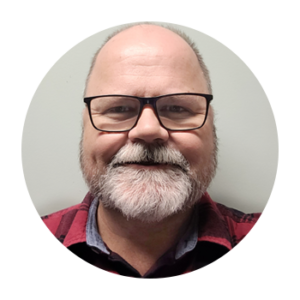
Ross MacIntosh
Peer Support Regional Lead, Ministry of the Solicitor General
A founding member of the 28-year-old Critical Incident Stress Management (CISM) team in Ontario Provincial Corrections, Ross is passionate about helping to support the mental health of his peers.
“Starting off as a correctional officer, I was exposed to, and involved in, some difficult situations. I learned very quickly that I needed to take care of myself if I was going to have a long career as a first responder. I think it’s paramount for anybody working as a first responder to focus on addressing their stressors. It helps you to take care of yourself, but also to support others and show leadership by being vulnerable and being open to communication.”
Ross was an integral part of the CISM program for the Ministry of the Solicitor General as a co-lead for the Eastern Region. He helped train new peers to become strong mental health supports and resources. He was also part of an advisory committee that worked on the development of a Peer Support Program, providing his insights, experiences, and knowledge.
“Studies have shown that your best resource is the people who work within your environment, who can talk about what it looks like, feels like, and smells like to go through trauma. I look at wellness as something that is holistic, so it’s got to be something that you embrace yourself. But you also need to be cognizant of what your organization can do for support, and what supports exist externally.”
In 2022, Ross, along with nine others, was hired to be a Regional Lead for the new Corrections Peer Support Program, which ultimately replaced CISM. He chose not to retire so he could help evolve this initiative into a comprehensive peer support program.
“We reached out to people who are directly connected to traumatic events, but they can also reach out to us independent of their manager, which is a very important new stream that we’ve included. We’ve got a 1-888 number, we’ve got social media postings. You have to learn to grow with the times and grow with the different communication styles to be able to connect with everybody.”
Ross has found mental health supports, and the new Peer Support Program, to be critically important for his colleagues struggling with mental health issues, but he says most important for PSP who are struggling, is to talk.
“You can find TED Talks, you can find supports out there. And to be honest, I don’t care who you talk to so long as you talk to somebody, because I know personally that that’s the biggest gain for me.

Michelle McKeaveney
Correctional Officer and Co-founder of River Valley Resilience Retreat
Michelle is a Pioneer of Peer Support/Founder/Facilitator, Presenter/Speaker and Leader. She has been a Social Worker and Correctional Officer at a Women’s Correctional Center since her Bachelor’s Degree Convocation in 1993. She has also worked as Mental Health Therapist/Counsellor as well as facilitator of programs on several First Nations communities for the past 25 + years.
Michelle is the wife of a Veteran who is also a Retired Federal Correctional Officer of over 25 years. She is a Survivor (Champion) of an OSI herself, Peer Group founder/leader of PSP Peer Support since 2016. She is mother of 3 adult children and her beloved Service Dog K9 Scooter.
Following her convocation with a social work degree in 1993, Michelle’s husband took part in a peacekeeping mission to Croatia. It was during this time that Michelle says she discovered a lack of mental health resources in Saskatchewan to support the families of soldiers. To address this gap, she started an informal Peer Family Support group in Prince Albert, which enabled families to support each other, and to be supported while their loved ones were in a war zone.
It’s been said that “Michelle’s blunt, honest, and heartfelt delivery combined with her highly energetic motivational approach leaves you feeling empowered and offers you the necessary tools to “let go and live free”, to remind you that life does not end with barriers or obstacles”.
Her identity and beloved career in Corrections ended abruptly with a diagnosis of Post-Traumatic Stress Disorder (PTSD/OSI), compounded with a diagnosis of Grave’s Disease, and Thyroid Eye Disease, which has required numerous surgeries at the Mayo Clinic.
“It is imperative and preventative that discussions around and about mental health and mental wellness occur in all aspects of safety organizations. Stigma reducing and morale boosting occurs when an agency can normalize the importance of resilience, before a trauma occurs,” she said.
In 2019, Michelle co-founded the River Resilience Valley Retreat. The Retreat is a year-round, safe, secluded, and serene space for public safety personnel, armed forces members, veterans, and their families. It enables those in need to recharge, rest, relax, recover, and develop the resiliency skills necessary in reclaiming their lives.
“After my own injury and diagnosis of an OSI in my career in Corrections, I realized there were no resources for us PSP to heal. I went after creating resources for us to heal and have post traumatic growth. Fast forward to being one of the two co-founders of the River Valley Resilience Retreat,” she said.
Michelle became certified in Mental Health First Aid-Veteran Community and has continued to advocate and encourage all Community/employers/organizations to bring awareness to mental health wellness and the advantage of peer support.
She has offered retreats for mental wellness, and has attended conferences, events, and rallies to bring awareness to mental health, post traumatic growth and PTSD. She regularly is asked to speak at meetings and special events on mental health stigma and PTSD.
“I assess the environment for the PSP that I am assisting, and I offer an approach that is relevant and relatable. Peers talking with peers reduces the stigma at the onset. I am constantly sharing about my OSI, my resilience and post traumatic growth. All heroes have their struggles in their careers, but it does not mean that they must be career ending. Most people are initially fearful of the process. I try to comfort, support, and have the individual ‘drive’ their own bus.”
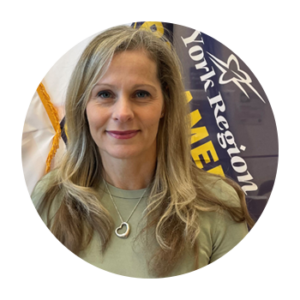
Marian Morgan
Program Manager at York Region Paramedic Services
Marian Morgan significantly contributes to bolstering mental health within the organization. In her role, Marian oversees key initiatives aimed at fostering psychological health, safety and resiliency among paramedics.
Responsible for a 60+ member peer support team, Marian ensures they are equipped with customized professional training, clinical check in’s and resources to support their peers. New members have access to a formal training program and peer to peer mentorship; this provides new members with a strong foundation of peer support principles and confidence as they enter this role. Notably, Marian pioneered an evidence based, employee focused and embedded return-to-work program, offering paramedics individualized support, including customized modified work opportunities, peer member reintegration support, and 1:1 clinical support.
Marian’s dedication to education and awareness is evident through her initiatives. She provides opportunities for peer support team members to become instructors for courses like Mindful at Work, ASIST, and Road to Mental Readiness, resulting in the education of numerous colleagues. Through collaboration with Wounded Warriors, Marian introduced Before Operational Stress training for students, recruits, and frontline paramedics, along with Diffusion training for peer support members. Additionally, she championed the implementation of Trauma Informed Leadership training during the pandemic and Queen’s University Certificate in Mental Health for Leaders, ensuring all leaders have the skills to support their staff.
Further advancing mental health initiatives, Marian has embedded the CSA Standard for psychological health and safety into workplace practices. She continually launches several initiatives throughout the year to achieve this goal, including the development of a Therapy Dog program, Healthy workplace month activities, anti-stigma campaigns and fostering safe space for members to share their personal stories of mental illness and recovery. . These initiatives further serve the mental health and wellbeing of the people of York Region Paramedic Services.
Marian’s commitment to promoting mental health awareness and education within York Region Paramedic Services is commendable. Her leadership and dedication contribute significantly to fostering a supportive and resilient workplace environment.

Vince Pashko
Mental Health Coordinator, City of St. Albert Fire Services
Vince brings over two decades of experience as a paramedic and firefighter, culminating in his appointment to the newly established in scope term-position of Health and Wellness Coordinator in May 2023. The role jointly created by the City of St. Albert Fire Services Fire Chief, Fire Administration, Human Resources, and the Union Executive, underscores the organization’s commitment to prioritizing the health and wellbeing of its members.
“In an organization committed to prioritizing the wellbeing of its members, we strive to provide tailored programs that address the unique needs of every individual. Although the work is challenging, dealing with circumstances both within and beyond our control, our dedication remains unwavering in our efforts to offer impactful resources and programs.”
In 2022, Vince assumed the role of team lead, contributing to the development of a reintegration program designed to support members transitioning back to work after rehabilitation. This collaborative effort which included support from across St. Albert’s organization, exemplifies powerful partnerships with Edmonton Police Services, Edmonton Fire Rescue Services, and Alberta Health Services among others in addressing critical needs,
“Working alongside external partners who have become trusted allies has been instrumental in implementing this vital program.”
Central to Vince’s role is dispelling misconceptions surrounding mental health within the public safety sector.
“I’ve encountered the misconception that admitting struggles denotes weakness in an industry that demands strength; however, acknowledging our challenges is a testament to our self-awareness and willingness to seek support. Just as we would not overlook a physical injury, mental health deserves the same attention. Authentic conversations in the workplace over time contribute significantly to reducing stigma.”
Vince emphasizes the importance of collective efforts in promoting health and wellbeing.
“I am fortunate to be part of a team of champions where health and wellbeing are viewed as collective responsibilities. Challenges are not meant to be faced alone, and collaborating with internal and external partners who possess expertise or have navigated similar challenges is invaluable. Mental illness knows no boundaries, and within the public safety sector, the challenges are shared across numerous services. It’s imperative to collaborate with the broader public safety community and mental health experts to collectively address these challenges and devise solutions.”
Committed to following best practices, Vince regularly consults with mental health experts. His recent advocacy involves supporting the Before Occupational Stress program and advocating for the growth and expansion of existing member support programs such as reintegration, peer support, peer fitness, and other wellness fitness initiatives. This underscores his dedication to enhancing mental health support for City of St. Albert Fire Services’ members.
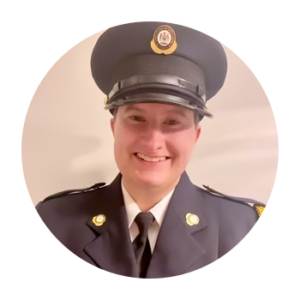
Nicole Roberts
Correctional Office, Ministry of the Solicitor General
“Prior to receiving mental health assistance for PTSD symptoms, I was that person who pushed through the symptoms and feelings associated with mental health concerns from the workplace. In doing so my symptoms increased significantly. Until I finally received help from both peers and professionals, I did not personally realize the affect this has, not only on your workplace performances but also your personal life.”
Working in Corrections at the Toronto South Detention Centre, Nicole says many employees do not want to talk to someone they may not know in the industry, due to a lack of trust with that person.
“I have tried to address this by first understanding who the person is and what they wish to talk about primarily. This tends to slowly build that trust and can open an opportunity to understand the root cause of their stress.”
She says the stigma associated with seeking help for mental health among corrections officers is significant.
“It is remarkably high within my industry and a large barrier especially with more senior employees. ‘I’m fine’ are the most familiar words I hear when dealing with an activation while first talking to someone. As someone who has dealt with mental health issues stemming from incidents in the workplace, I know personally that the ‘Band-aid’ most law enforcement place over their mental health concerns is a significant issue.”
As a peer support officer Nicole says she uses a technique that allows an officer to vent, enabling that individual to open about the issue without realizing they are seeking help while doing so.
“I find allowing them to talk about their emotions and reassuring them that although someone else may not have voiced it during the incident, they are most certainly experiencing a similar emotional response, helps. Once they are not feeling so alone in their own emotional response, they tend to be more open to the opportunity to discuss how they are dealing with their stress, and what better options might be available to them.”
Nicole’s colleagues say that as a peer support officer, she is always willing to be available for individuals to come and speak to her regarding stressors of the job or life circumstances. She is also seen as a positive role model to her peers who care deeply about individuals’ mental health.
“It is something I feel honoured to do for others, as my own peers were my saviours when I needed them most. To feel as though, in some small aspect, I may have successfully helped someone else, is the greatest feeling.”
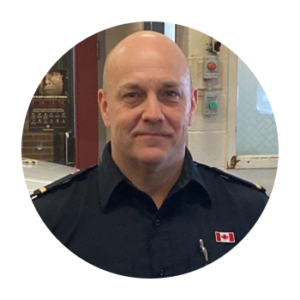
Craig Smith
Fire Lieutenant, St. Johns Firefighters Association, Newfoundland
Craig has dedicated 26 years to serving as a fire lieutenant and rescue professional, concurrently advocating for mental health throughout most of his career.
He emphasizes the paramount importance of safeguarding the lives and wellbeing of firefighting personnel and their families.
In 2017, Craig assumed the role of representing IAFF firefighters east of Ontario on the International Association of Firefighters (IAFF) Behavioural Health Committee. He played a pivotal role in establishing the St. Johns Firefighters’ Association’s Behavioural Health Committee and facilitating the IAFF Peer Support Program & Critical Incident Stress Management (CISM) Team training for 28 members. Craig underscores the significance of educating firefighters about mental health to equip them with essential coping mechanisms.
While he actively participates in podcasts, webinars, symposiums, and conventions on mental health, Craig underscores the necessity of extending education to those most in need within firefighting organizations.
Craig stresses the importance of organizational awareness regarding members’ mental health challenges to identify pertinent educational requirements and establish effective support programs.
He advocates for dispelling misconceptions surrounding the necessity of mental health initiatives for public safety personnel. Craig emphasizes the unique and frequent exposure of first responders to traumatic events, necessitating tailored treatments and resources.
Recognizing the distinct experiences of first responders, Craig aims to highlight the critical role of adequate tools, resources, education, and support in maintaining their ability to fulfill duties effectively.
For Craig, the measure of success in a mental health program lies in members actively seeking additional information and resources.
Colleagues commend Craig for his passion and attribute major successes within their organization to his tireless efforts, affirming that members have benefited from his dedication.

Marsha Snyder
Regional Manager, Employee Assistance Program (EAP) and Critical Incident Stress Management Program (CISM), Correctional Service Canada
For over 10 years, Marsha has worked for Correctional Service Canada, beginning as a Behavioral Science Technologist, and then moving to the position of Correctional Programs Officer. In these roles, she has helped to address the mental health and risk factors of vulnerable, disadvantaged, and challenging populations.
While working in the institution, she was an active member and leader of EAP/CISM teams at the Milhaven Institution. Marsha is now the Regional Manager of EAP-CISM in Ontario managing approximately 170 peer volunteers to provide support, guidance and resources to employees on the frontline.
“Working in a high trauma-risk environment, employees are exposed to incidents that are not normal. They are seeing, hearing, reading things that are impactful, that will change the way they view and experience our world. In this type of work, we need to prepare staff for this, but especially assist with enhancing their ability to cope with some of their experiences as a first responder and a public safety personnel.”
Outside of traditional therapeutic intervention, Marsha believes we must be creative in helping people to explore coping strategies. It is important to educate and introduce strategies that people may not know can help manage their mental health. Marsha has brought in education surrounding music and song writing for wellness, dog therapy for staff at the institutions, mindfulness practices such as chi gong, sound bowls, and meditation. Coping with mental health and wellbeing is very individualized and she wants people to be able to learn and explore as there is a wealth of options.
Marsha has been highly engaged in preventative support work, and is working to lessen the stigma of mental health in the workplace. This includes talking about mental health, sharing experiences, bringing in speakers to talk about their experiences and post traumatic growth etc. Her intention in this is to normalize mental health, normalize a person’s responses to critical incidents, and to bring a sense of connection; to know you are not alone in your experiences with the hopes that this would increase someone’s ability ask for support.
Following the lifting of COVID-19 restrictions, and to rebuild a dedicated team experience, she organized a two-day professional development conference for those involved with peer support. More than 80 individuals attended the conference, which included workshops centered on compassion fatigue, biology of stress, coping, resiliency strategies, dog therapy, hands on mindfulness practices, and more.
“Those two days allowed our teams to re-establish their connections, continue to develop their skills to not only support their peers wellness, but also their own. It was a way to recognize and bring awareness of the important work they do on the frontline. I knew the conference had been impactful when at the end of the two days several peers approached me to provide positive feedback. I felt very excited to have been able to organize something that was meaningful for our incredible EAP-CISM peers.”
For Marsha, being a Champion of Mental Health has also had its challenges, but she believes that maintaining relationships with colleagues is critical to creating a culture that supports mental wellness.
“I think that maintaining strong relationships with my colleagues is the most important thing. It is through these connections that the real ability to assist and support others begins.”
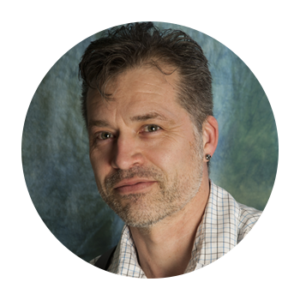
Sheridan Taylor
Instructor/Trainer, Alberta Sheriffs
Sheridan Taylor is resilient, compassionate, and dedicated to mental health advocacy within the PSP sector. His journey from being a Métis Canadian Army combat veteran, to a corrections officer, suicide survivor, mental health advocate, and best-selling author of Not Okay? Okay: A Road Map Back from the Brink underscores his concern about, and his dedication to, improving the mental wellbeing of his peers and colleagues.
“The most powerful tools I’ve found are empathy and vulnerability. Once I’ve shown that I want to understand and share their pain, and tell at least part of my story, we create trust that allows connection. Connection creates emotional validation. It’s the positive social feedback that repairs trauma caused by the initial negative social feedback that causes trauma.”
Sheridan has been heavily involved in the development and implementation of mental health programs within the public safety sector. Over the past year, he has initiated a groundbreaking peer-led, peer-driven, peer support program for Alberta Sheriffs.
“Peer support mental health programs run by trained personnel significantly lower the costs of health services, improve engagement with those services, and enrich quality of life. These programs are vital to prevention and recovery from trauma and operational stress injury-caused illness, by giving social support to those sharing common experience. They work by giving encouragement, agency, empowerment, and hope that recovery is achievable.”
He says these programs are important historically. He points out that it is important for PSP to see that public safety organizations recognize their mental health needs.
“For decades, agencies have overlooked the harm our careers have on our families, and the spiraling descent into chaos that our officers go into because of the harm they bring home, causing harm to their families, depriving themselves of support and making everything worse. We have this ridiculous idea that we can take our trauma and stress off when we take our uniform off. It doesn’t work that way.”
He advocates for building support for families, to strengthen support for officers.
“If we make families stronger, we make the officer stronger, and building resilient families builds resilient agencies. Mental health programs contain education about and for families of public safety organization members.”
Sheridan has worked in collaboration with mental health experts to promote best-practices and the use of an established evidence-informed peer support model. He says he doesn’t let stigma around mental health get in the way of reaching someone in need.
“We had a saying in the Infantry: ‘under, over, around, or through’. I stick to that adage. There is always a way to get the message across. There is always a way to reach someone in pain who needs help. There is always a way under, over, around, or through.”

Andriy Tyshkevych
Correctional Staff Training Officer, Corrections Canada
Andriy Tyshkevych exemplifies dedication and leadership as a training officer deeply committed to addressing the prevailing mental health crisis with compassion and sensitivity. Currently at the helm of the LINKED project, Andriy spearheads efforts to forge connections and provide vital mental health support within the organization.
With a steadfast focus on evidence-based practices, Andriy draws from personal experiences and collaborates closely with mental health specialists to shape the LINKED project. Serving as a comprehensive platform, this initiative addresses various facets of mental health, encompassing physical, spiritual, and emotional wellbeing, while also offering resources for goal setting, self-reflection, coping skills, nutrition, positive lifestyle habits and stigma reduction.
Throughout his career, Andriy has recognized the paramount importance of prioritizing mental health within the public safety sector, particularly in high-stress environments like Corrections. By embodying a role model and cultivating a culture of peer support, Andriy encourages his colleagues to prioritize their mental wellbeing.
A standout achievement in Andriy’s repertoire is the conceptualization and execution of the LINKED program within the Correctional Training Program. This 14-week initiative is dedicated to promoting personal wellness and instilling sustainable lifestyle changes through the power of habits, peer support and immersive activities, Andriy’s unwavering persistence and innovative approach have been instrumental in the program’s resounding success.
Beyond his professional endeavors, Andriy remains fervently committed to dispelling misconceptions surrounding mental health and advocating for holistic wellbeing. He underscores the significance of fostering open dialogue and normalizing discussions around mental health, urging individuals to proactively seek support and prioritize self-care.
In his personal life, Andriy nurtures his own mental wellbeing through outdoor pursuits, regular physical exercise, and communing with nature. He firmly believes in the transformative potential of consistent, incremental actions in enhancing mental health and advocates for proactive wellness practices.
In summary, Andriy Tyshkevych’s unwavering commitment to mental health advocacy and his innovative contributions to the LINKED project undeniably qualify him as a deserving recipient of the Champions of Mental Health Award.

Teresa Ullyott
Search and Rescue, Edmonton Regional Search and Rescue Association
Teresa has been an integral figure in emergency management and related fields such as Search and Rescue since 2013. Her colleagues attest that her leadership within Edmonton Regional Search and Rescue Association has profoundly enhanced the team’s mental health. Teresa’s dedication stems from her genuine concern for the wellbeing of individuals in the sector who may be struggling.
“I believe everyone deserves to thrive, be happy, and enjoy life. When mental health issues persist and negatively impact someone’s life, it’s truly concerning.”
Teresa has been a driving force behind several impactful initiatives. She championed resiliency training by mental health experts and spearheaded the creation of comprehensive mental health resources, including policies, protocols, and informational sheets addressing stress, coping mechanisms, and finding support. Additionally, she played a pivotal role in implementing a robust peer support program rooted in evidence-based practices.
“I’ve had first responders and frontline responders share their mental health struggles with me. Witnessing the positive outcomes from accessing resources reinforces the importance of prioritizing mental health in these roles.”
Teresa’s initiatives have cultivated a culture of mental strength and camaraderie within her Search and Rescue (SAR) team and the SAR community, ensuring resilience and cohesion during demanding missions. Her approach prioritizes evidence-based practices to ensure the effectiveness and reliability of these resources.
“When supporting personnel with mental health impacts and challenges, active listening is crucial. Creating a safe space for them to share their stories and actively listening without judgment fosters trust and understanding.”
Teresa is proactive about supporting her own mental health, utilizing various tools and strategies.
“I regularly evaluate my mental wellbeing and take necessary steps to maintain it. This includes activities like going for walks, exercising, talking to someone, eating properly, and getting adequate rest.”
Teresa acknowledges the support she has received particularly from key members of the Alberta Critical Incident Peer Network and her team’s executive, which has facilitated her work.
Teresa’s unwavering dedication to mental health advocacy has made a lasting impact on her community and serves as an inspiration to her colleagues and peers.

Andrea Wichuk
Firefighter, Parkland County Fire Services, Wabamun, Edmonton
Andrea is passionate about her work on the Parkland County Fire Service Peer Support Team because of the impact she has seen of prolonged incident exposures on many incredibly talented and strong public safety personnel (PSP).
“Unsupported continuous and prolonged exposures have impacted many incredibly talented and strong public safety personnel, many of whom we unfortunately no longer have the privilege of serving with. Our colleague’s departure from emergency services has left a substantial companionship, knowledge, and mentoring void as they have chosen to manage circumstances such that they dramatically reduced, altered or eliminated their exposures to these stressors.”
A 22-year frontline firefighter veteran, and lead for the Parkland County Fire Service Peer Support Team, Andrea is one of the most active peers on the Alberta Critical Incident Peer Network (ACIPN). She regularly volunteers to respond to peer support requests for firefighters throughout Alberta. Her colleagues say Andrea’s evidence-informed approach, compassionate leadership, and commitment to reducing stigma have created a lasting and transformative effect on mental health support in the firefighting community.
“For too long there have been barriers to care, either perceived or actual, which prevented individuals requiring support from seeking it. It is my biggest hope that we can normalize and make quality care readily available to all PSP not just in Canada but eventually throughout the world,” she said.
Andrea has spearheaded the creation of evidence-informed peer support resources, and she collaborates with mental health professionals to develop comprehensive training materials and protocols rooted in the latest research. She says her most favoured strategies for supporting the mental wellbeing of public safety personnel are ensuring the PSP understands that they are not alone in their response to a serious incident or when cumulative stressors start to impact their normal balance coupled with being fully present for that PSP, providing safe and comfortable space without judgment through their difficult time.
Andrea’s commitment to evidence-informed practice extends beyond her organization. She actively consults and mentors’ firefighters from other fire departments, sharing her knowledge and experiences in implementing and maintaining evidence-based peer support programs. She emphasizes the importance of tailoring these programs to the unique needs of each department.
“Understanding the culture, dynamics and experiences of a given team as a whole and the individuals within it helps to inform the approach required.”
Andrea credits her ability to undertake peer support work, to her organization.
“I have incredible support from my own organization and those I have connected with throughout the province. I suspect that there are still many out there who may not have this same support afforded to them, and I am so grateful to say my team and I do. Working in the field of mental health is a passion for me and with that comes immense pride and a compelling drive to continue on this path.”

Spencer Wold
Paramedic, Medavie Health Services, Alberta
Spencer Wold, a paramedic with 13 years in the profession, and Team Lead for Medavie Health Services’ Peer Support Team in Alberta, has profoundly impacted mental health for Medavie paramedics.
Committed to fostering a mental wellness culture among his paramedic colleagues, Spencer believes that recognizing the importance of maintaining mental health is crucial for public safety personnel (PSP) because of the unique and often challenging nature of their work.
“Repeated exposure to traumatic events, high-stress situations, and the constant demand for quick decision-making can contribute to mental health challenges. Prioritizing mental health helps prevent burnout, reduces the risk of conditions like PTSD, and promotes overall wellbeing, allowing first responders to perform their duties effectively and sustainably throughout their careers.”
As a peer support leader Spencer has been instrumental in providing a safe and empathetic space for his colleagues to discuss the challenges they face in their high-stress profession. Spencer says some of the strategies that he has found most effective in supporting mental wellness in PSP are peer support programs, mental health training, access to counselling, regular mental health check-ins, and flexible scheduling and workload management.
“These strategies can all contribute to a supportive environment, fostering mental resilience and reducing the impact of occupational stressors on public safety personnel.”
He says the stigma around mental health continues to exist in many workplaces. He focuses on addressing these misconceptions by sharing the mental health challenges and experiences he has faced.
“Being open to these discussions can humanize the issue and break down the stigmas that we have all felt as first responders. I strive to promote education and awareness on the prevalence of mental issues, as well as the impact of trauma, by emphasizing that seeking help and prioritizing mental health doesn’t diminish one’s professionalism but enhances resiliency and our ability to cope with the demands of the job.”
He says he advocates for readily available mental health services because this reinforces the importance of proactive mental health care, and as a result, encourages a culture that values empathy and compassion where individuals feel comfortable seeking support without judgment from their peers.
In 2021 Spencer, with the support of his employer, was involved in creating and organizing a Paramedic Peer Support Team. It is something of which he is very proud.
“It has had such a positive impact in the promotion of pre-incident education, and in establishing the importance of proactive mental health within our EMS community, especially for the newer generation of paramedics coming into the field. As a result of this initiative, I have been able to share insights, experiences, and advocate further for positive change within our organization, and I am able to contribute towards a healthier, more understanding approach towards mental health education within our profession.”